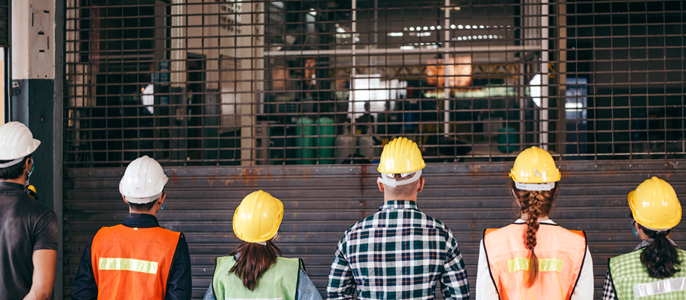
NDMA issues precautionary measures to be taken by the manufacturing units while restarting the operations
Following the recent incident of gas leakage at Visakhapatnam’s LG Polymer Plant, which claimed lives of 12 people, the National Disaster Management Authority (NDMA) issued latest guidelines that need to be carefully considered by the manufacturers while restarting operations after the imposed lockdown due to COVID-19 comes to an end.
With lockout/tagout procedures properly placed, many energy resources in industries may have become hazardous for the supervisors/operators, who are dealing with mechanical, electrical, or chemical equipment, a senior NDMA authority recently stated.
Heavy machineries and equipment when not serviced or maintained periodically can become hazardous for the engineers operating them, the authority further added. Additionally, hazardous substances like combustible liquids & gases, open wires, conveyor belts, and automated vehicles make these industrial units high-risk areas.
In a nutshell, the NDMA advised that improper safety codes enforcements and inappropriately labeled chemicals can cause serious health hazards.
“Post lockdown period for safety protocols, not for achieving high production targets”
Ahead of granting permission for industrial operations, the NDMA authority laid emphasis on safety protocols post lockdown period, rather than high production targets.
“While restarting the unit, consider the first week as the trial or test run period; ensure all safety protocols; and not try to achieve high production targets”, the authority stated.
The NDMA official also said that precautionary measures need to be followed, such as sanitization of equipment should be done before and after the use.
Along with this, some abnormalities should be timely detected, like abnormal sound or smell, smoke, leakage, etc. that suggest immediate preventive actions or even shutdown.
Social distancing not going anywhere
Along with sanitization, factories should strictly follow social distancing to prevent the spread of COVID-19, even after the lockdown is over.
Inspection of equipment should be done on a daily basis, and industry protocols should be strictly followed during the time of this emergency.
The NDMA also said that if industries face any difficulty in managing crucial backward linkage during the phase of the restart, which can be a hindrance to safe functioning, they should immediately approach the district administration for required and proper assistance.
To deal with such situations, Center and District Magistrates have also tied up to assist and facilitate such industries and ensure their end-to-end operations maintain the industrial safety standards.
GUIDELINES SPECIFIED BY NDMA FOR MANUFACTURES AND WORKERS
After several weeks of lockdown that brought the economy to a standstill, industries were expecting to get few relaxations for restarting the operations.
Thus, the government has divided areas into three zones: Red, Orange, and Green depending on the health status of the areas.
Owing to this, the government is planning to gradually release lockdown in some areas, allowing economic activities according to the orders of NDMA and the Ministry of Home Affairs (MHA).
While permitting the reopening of factories, NDMA instructed state governments to ensure the off-site disaster management plan of the respective Major Accidental Hazard to be up–to–date, and their preparedness of implementation is high.
It also advised all the officers to ensure on-site disaster management plans, including Standard Operating Procedures (SOP) for safe restarting of industries during and post lockdown.
Guidelines for specific industrial processes
While the ones mentioned above are some of the generic guidelines outlined by NDMA, the following are the guidelines for specific industrial processes regarding Storage of Raw Materials& Products, Manufacturing Processes, and Safety of Workers.
FOR RAW MATERIALS AND PRODUCT STORAGE
- Check open vessels/bags/containers for any possibility of rusting, rotting, or any chemical reaction.
- Properly inspect the areas of storing these chemicals and ensure proper lighting and ventilation near them.
- Monitor safe operations of supply pipelines, valves, containers, and conveyor belts. Any wear and tear or leakage should be immediately sensed & informed.
- Chemical stability of HAZMAT chemicals should be checked before using them for any process.
FOR MANUFACTURING PROCESSES
- Mechanical cleaning of supply pipelines and equipment should take place followed by air, water, or chemical cleansing.
- Safety audits should be carried out by the industries before restarting production.
- Proper checkups of lining to be done for boilers/heat exchanges and furnaces.
- Monitor and maintain the pressure and temperature levels of equipment and ensure all the gauges are functional.
- Tightness levels of factories should be kept compliant to the required parameter to avoid the incidents of disaster or damage occurred due to the toxic and hazardous substances.
- Service test should be carried out for the equipment having normal operating fluid. Leakages should be detected using the soap solution. The rising foam marks leakage and the point is then retightened.
- To deal with any emergency during the run, technical teams and emergency crew should be available round-the-clock with an extended coverage area of 200 kms.
FOR WORKERS AND OPERATORS
- Health checkups like thermal screening of employees should be done on daily basis, and complete rest to be given to any of the workers with ill health or showing any symptoms.
- Sanitization of workplace should be done at regular intervals, especially covering the shared areas such as lunchrooms, meeting halls, etc.
- Management should educate workers and labor about coronavirus and enlighten them about the ways of prevention.
- Hand sanitizers and fresh masks should be distributed among the employees, and arrangements for their proper disposal should also be made.
- Barricading should be done in the factories to effectively implement social distancing among the workers.
- Raw materials and products brought in the factory premises should be properly sanitized and made safe before touching.
CONCLUSION
Long story short, the NDMA has strictly advised all the manufacturing industries to take the required safety measures that have been mentioned above.
There have been specific guidelines for process manufacturing industries such as chemical, paint, and cosmetics manufacturing industries that deal with hazardous and toxic substances.
As we know, for process manufacturing businesses, ERP software is the solution that automates, streamlines, and manages core business processes.
A trusted name with over 30 years’ experience in delivering process manufacturing solutions, BatchMaster leads the way in helping your process industry stay compliant with safety protocols post COVID-19 lockdown.
For more information, contact our ERP experts today.


















